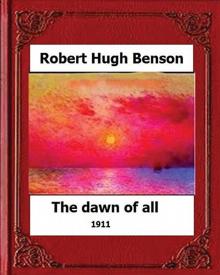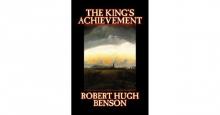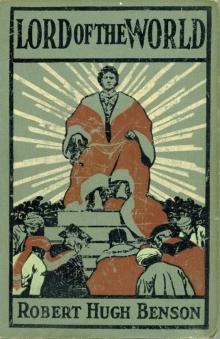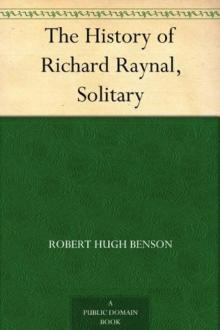- Home
- Robert Hugh Benson
The Dawn of All Page 52
The Dawn of All Read online
Page 52
(III)
The arrival at Boston harbour was one more strange experience,and the more strange because the man who had lost his memory knewthat he was coming into a civilization which, although utterlyunknown to him by experience, yet had in his anticipation acurious sense of familiarity.
They had met with westerly gales, and although the movement ofthe ship seemed wholly unaffected (so perfect was the balancingsystem), yet the speed was comparatively low, and it was notuntil shortly before dawn on the second day that they came insight of the American coast.
Monsignor woke early that morning, and after lying and listeningfor half an hour or so to the strange little sounds with whichthe air was full--the steady rush of wind like a long hush; theshivering of some tiny loose scale in one of the planes outsidehis window; a minute inexplicable tapping beneath the floor ofhis cabin--all those sounds so unidentifiable by the amateur, andyet so suggestive--he got up, dressed, and went across to theoratory, where he had said Mass on the previous morning, to sayhis prayers. When he had finished he came out again, wentupstairs, and along to the end of the ship, whence from aprotected angle he could look straight ahead. The lights were allon, as the sun was not yet up, and the upper deck, except for apatrolling officer, was entirely empty.
For a while he could make out little or nothing beyond thejutting prow beneath him, itself also illuminated, and variousoutlines and silhouettes of devices and rigging which even now hedid not properly understand. Then, as his eyes grew accustomed tothe dark, he began to see.
Beneath him flitted a corrugated leaden surface, fleckedoccasionally with white, which he knew to be water, eight hundredfeet at least below, and once he caught a glimpse of aflattened-looking, fish-shaped object, which went again in aninstant, lighted interiorly, which he guessed to be a coastingsteamer. Before him nothing at first was visible except anenormous gulf of gloom, but presently, as the dawn came onbehind, this gulf became tinged with a very faint rosy colour inits upper half, enabling him to distinguish sea from sky, andalmost immediately afterwards the sea itself turned to a lividpale tinge under the glowing light.
The next thing that he noticed was that the edge of the sea againstthe sky began to look irregular and blotted, a little lumpy hereand there, and as he looked this lumpiness grew and rose higher.
He turned as the step of the officer sounded close to him.
"That's land, I suppose?" he said.
"Yes, father; we shall be in by half-past five. . . . Beg yourpardon, father, are you staying long?"
Monsignor shook his head.
"That depends on a hundred things," he said.
"Curious idea this colony; but I dare say it's best."
Monsignor smiled and said nothing.
* * * * *
Interiorly his heart had been sinking steadily during thejourney. He had mixed freely with the emigrants, and had done hisbest to make friends; yet there was something not only in theirattitude to him--for though they were respectful enough, theywere absolutely impervious to any advances, seeming to regard himas independent but rather timid children might look upon astrange schoolmaster--but in their whole atmosphere and outlookthat was a very depressing change from the curious, impassive,but alert and confident air to which he had grown accustomedamong the priests and people with whom he mixed. The one thingthat seemed to interest them was to discuss methods of governmentand the internal politics of their future life in Massachusetts.They asked a few questions about crops and soil; he even heardone group in animated conversation on the subject of schools, butthe talk dropped as soon as he attempted to join in it. They alltalked English too, he noticed.
Yet though the atmosphere seemed to him very ungenial, itappeared to him not altogether new; there appeared, somewhere inthe back of his mind, to be even an element of sympathy. He feltalmost like one who, having climbed out of a pit to the freshair, looks back at others who not only live in the pit, but arecontent to live there.
For the world in which he had now consciously lived for the lasttwelve months was, in spite of the sharp rigidity and certitudeand inexorable logic from which he shrank, undoubtedly a place oflarge horizons. In fact it seemed as if there were no horizons.On all sides there stretched out illimitable space, for eternity(with its corollaries) was fully as effective in it as was time.Those with whom he mixed, however little he might share theiremotions, at any rate talked as if death was no more than anincident in life. Secretly he distrusted the reality of thisconfidence; but at least it appeared to be there. But with thesefolks all was different. These frankly made their plans for thisworld, and this world only. Good government, stability, goodbodily health, the propagation and education of children,equality in possessions and opportunities--these were their ideasof good; and better government, greater stability, more perfecthealth, grandchildren and great-grandchildren, and more uniformequality, their ideals.
So he pondered, over and over again, trying to understand why itwas that he was at home with neither party. With his old friendshe felt himself incapable of their certitudes and aspirations;with these new people, viewed for the first time _en masse_, hefelt life resting on him like a stifling blanket. He told himselfbitterly that he resembled the child's Amphibian, which could notlive on the land and died in the water.
He watched mechanically the vault of heaven broaden and brightenwith the sunrise behind, and the waste beneath presently to showlines and patches and enclosures as they approached Bostonharbour. And his heart sank as each mile was passed, and aspresently against the clear sky there stood up the roofs anddomes and chimneys of the socialistic Canaan.

 The Dawn of All
The Dawn of All By What Authority?
By What Authority? The King's Achievement
The King's Achievement Lord of the World
Lord of the World The History of Richard Raynal, Solitary
The History of Richard Raynal, Solitary Come Rack, Come Rope
Come Rack, Come Rope